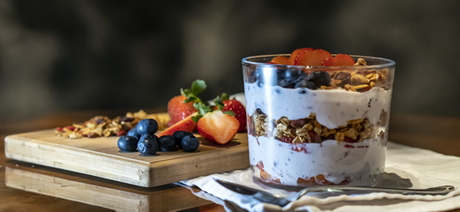Are you looking for ways to make mealtimes easy, tasty, and healthy for your toddler? Here are some ideas to get you sorted.

Children, especially toddlers who are undergoing a growth spurt, are often very energetic. Therefore, it’s important to adjust their diet to not only meet their energy needs but also make sure that they're getting the proper nutrients for their physical and mental development.
However, getting toddlers to eat properly is quite tedious as they can get quite fussy about their food, and it can get a little frustrating when you can’t get them to eat a full meal.
Here are some simple meal ideas that will make your life a lot easier. But before that, let’s see which nutrients your toddler can’t do without.
What Nutrients Does Your Toddler Need?
When you’re brainstorming healthy toddler lunch ideas, it’s important to know what kind of nutrients they really need. In general, toddlers should be given food rich in calcium, iron, carbohydrates, proteins, fats, vitamins A, D, and C.
Let’s find out which foods contain these nutrients and how they help with your child's growth.
1.Calcium
Your child needs about 500 milligrams of calcium daily to ensure the proper development of teeth and bones. Although calcium is readily available in milk, toddlers tend to avoid it. Luckily, you can give them other things like cheese, yogurt, and green leafy vegetables.
These should be more than enough to meet your child’s daily needs. On top of that, children love cheese so much that they’ll often pick through their food to eat just that! So you don’t have to worry about them missing out on their calcium.
2.Iron
Iron is necessary for the development of your child’s circulatory system. Foods that are rich in iron include fish, poultry, red meat, beans, green vegetables, and eggs. Fortunately, all foods mentioned above can be used to make delicious meals for your child.
3.Carbohydrates
Remember how toddlers need a lot of energy? Well, this is where carbohydrates come in. Carbohydrates are broken down in the body to produce glucose, which is the molecule that supplies your child with energy to keep them active throughout the day.
Carbohydrates can come from fruits, rice, and bread. The tastiest source of carbohydrates, of course, are potatoes!
Going for complex carbohydrates is usually a better option and they can be found in whole wheat products or in brown rice. These foods are also rich in fiber, which helps keep your child’s digestive system running smoothly.
4.Proteins
Proteins are essential when it comes to the proper growth of muscles, organs, and other tissues in the body. Some of the food mentioned earlier - meat, fish, and yogurt - are rich in proteins. Besides these, you can also give your child beans and lentils as well.
5.Fats
This bit is a little tricky. Not all fats are healthy; they can eventually lead to childhood obesity if fed in large amounts. Healthy fats are often referred to as unsaturated fats.
Peanut butter, cheese, avocado, and nuts contain a lot of healthy fats. These fats, especially omega-3 fats, help with your toddler’s cognitive development.
6. Vitamins
Vitamins are micronutrients that play a huge role in the growth of your toddler. Vitamin A is usually responsible for better eyesight. Together with vitamin C, vitamin A boosts immunity, ensuring that cuts and bruises heal quickly.
Lastly, vitamin D makes sure that bones and muscles form properly. Besides milk and eggs, salmon and tuna are also good sources of these micronutrients.
Nutritious Meal Recipe Ideas

https://unsplash.com/photos/W2d_FskKkpw
Now that you’re aware of the nutrients your toddler needs, let’s check out some simple meal ideas for your toddler.
1.Fruit Skewers
Making food for children involves making the meal look visually appealing. Fruits are, by nature, fit the bill. However, you’ll always notice that whenever you dice fruits and serve them in a bowl, your toddler will most likely fish out only one of the fruits while leaving the rest.
To stop that from happening, why not make fruit skewers? You will need some strawberries, clementines, pineapples, and kiwi fruit. Cut them into bite-sized pieces and put them through kid-friendly skewers like straws. Serve this colorful snack to your child and watch them gobble it up in no time.
2.Healthy Parfait
Everyone deserves some dessert after a good meal; and even without a meal, it won’t hurt to have something sweet and healthy as a snack! To make a healthy parfait, you will need some yogurt, fresh fruits, and graham crackers for toppings.
As the parfait needs to be arranged in layers, start by taking a small cup and putting some yogurt at the bottom. Now add your fruit of choice and add a layer of yogurt over it.
Repeat the process until you have filled the cup and end with a layer of yogurt. Sprinkle some crushed graham crackers over the top, and it’s ready to serve.
3.Mac ‘n Cheese with Vegetables or Meat
Mac ‘n cheese is everyone’s favorite comfort food. You can never go wrong with this, and you can add many ingredients to it to increase its nutritional value.
You don’t need to do anything fancy to prepare this meal. Once you are almost at the end of cooking your mac ‘n cheese, pour some diced carrots or frozen peas into the mix and stir well.
You can also add in some diced sausage as well if you feel like the meal needs more protein.
4.Vegetable Fried Rice
Fried rice is also one of those things that everyone loves. If you happen to have some leftover rice in the fridge, this recipe is perfect for you.
Heat your pan over the stove and pour in some oil. Start off by scrambling an egg. Once you see it browning, add in your vegetables and proteins. For vegetables, you can add carrots and peas — they’re usually always around and the easiest to toss into the mix. For protein, you can go with boneless chicken, beef, or even sliced sausages.
After frying these ingredients for about a minute, add in your rice. Cook this for another two to three minutes before adding a little bit of soy sauce to give it a touch of flavoring.
5.Korean Rice Rolls
For our last recipe, here’s something a little more creative. This recipe might be a little complicated for first-timers, but once you give this to your toddlers, rest assured they’ll be asking for more!
Kimbap, or Korean rice rolls, are basically a seaweed wrap that’s filled with rice, vegetables, and fried eggs. The most commonly used vegetables in kimbap are baby spinach, carrots, and yellow radish (although you can skip yellow radish).
You will need a bamboo rolling mat, large sheets of seaweed, and of course, a kitchen knife.
How to Make Korean Rice Rolls
- Start by cooking the rice (sticky rice).
- Then prepare the filling using vegetables and eggs, shredded chicken, and even cheese.
- Cut your vegetables into thin slices. You can lightly fry the carrots and boil baby spinach.
- Beat at least three eggs and cook them until they are firm enough to cut into slices. When you are done preparing the rice and fillings, bring everything together on a flat surface.
- Take a healthy helping of rice in a bowl and mix it with sesame oil and salt. Use a rice paddle to evenly mix and pat down the rice.
- Cut a sheet of seaweed in half and lay it down on the rolling mat.
- Scoop out some rice and begin to spread it evenly across the surface of the seaweed. Use the palm of your hands to press the rice firmly down on the seaweed. The rice should be placed a little more than halfway down the mat.
- Place your fillings horizontally across the rice. Do this on the end of the mat that’s facing you.
- While holding down on the fillings with the rest of your fingers, gently lift the mat with your thumb and begin rolling forward. Do this slowly, pressing down each time to make sure the seaweed sticks to the rice underneath. Keep doing this until you reach the part of the seaweed that you left empty. Press down firmly to form a long cylindrical roll.
- Slice the roll into pieces, and it’s ready to serve.
Conclusion
Feeding your children comes with a lot of hurdles. In order to find the right food for them, keep experimenting with different recipes until you figure out which combination your toddler likes the most. But the key doesn’t only lie in the food you make, but also in the norms that you set at the table.
Make it a habit to eat together as a family—it’s not only a good way to develop your child’s table manners, it’s also a good way to bond with them. Furthermore, watching their parents eat healthy food also keeps them motivated to do the same.

